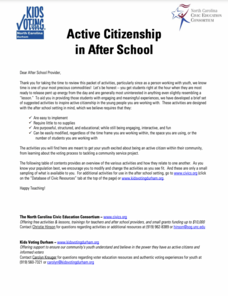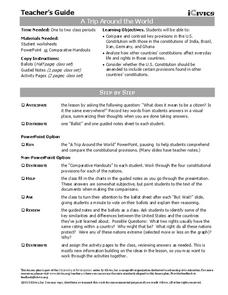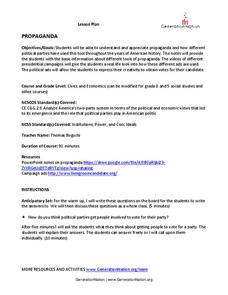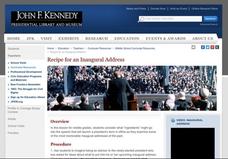PBS
Democracy in Action: Freedom Riders
This is a must-have resource for every social studies teacher covering the civil rights movement. Through an engaging video and detailed viewing guide, young historians learn about the Freedom Riders, and discover how everyday...
US National Archives
Documented Rights Educational Lesson Plan
How have groups struggled to have their unalienable rights recognized in the United States? Acting as a research team for the Human Rights Council of the United Nations, your young historians will break into groups to research...
New York City Department of Education
Geography and Early Peoples of the Western Hemisphere
Young historians discover the early people of the western hemisphere. The unit explores how the land changed, how it was used and homes of early Americans such as Incas, Mayans, Inuits, Aztecs, and Pueblos. Individuals also examine these...
Mikva Challenge
The Great Electoral Race Kickoff
Do young people care about elections? Host a discussion about the role of young citizens in the electoral process with an engaging social studies lesson. As high schoolers read and respond to four statements about youth interest in...
Caucus 101
Linkage Institutions: Interest Groups: Option A
How are elections really run and won? Learn about special interest groups, super PACs, and lobbyists with an engaging lesson about the caucus process. Young voters research specific interest groups and analyze their part in previous and...
Carolina K-12
Active Citizenship in After School
Active citizenship is the bedrock of any great democracy. Continue the trend by teaching the next generation about voting rights and the functions of elections in society. The variety of activities in the resource includes a human...
iCivics
A Trip Around the World
How do the rights of citizens in other countries, such as India, Germany, Brazil, and Iran, compare to those of Americans? Take a closer look at the provisions of various foreign constitutions, and compare and contrast the protections...
Center for Civic Education
The Power of Nonviolence: Music Can Change the World
Here is a fantastic activity through which class members discover how music has the ability to influence others in a meaningful way. After reviewing selected pieces and modern-day protest songs, learners will research other songs that...
Center for Civic Education
Constitution Day Rap
Engage your class while learning about the US Constitution with this fun primary grade social studies lesson. After viewing a picture of the US Constitution, young learners piece together a US flag using stars and...
Curated OER
Constitutional Convention Simulation
Why did the Founders make it so challenging to amend the US Constitution? To gain an understanding of why the process is so difficult, class members engage in a Constitutional Convention simulation. Groups draft, propose, and debate...
Center for Civic Education
The Power of Nonviolence: What Is Nonviolence? What Does It Cost?
Your young learners will delve into the language of primary source documents in order to identify the characteristics, benefits, and costs of nonviolence. The lesson includes a mix of activities, including an anticipatory activity,...
National Endowment for the Humanities
Revolution '67, Lesson 1: Protest: Why and How
To some people, protesting is as American as apple pie, but the factors that lead to protests can be as confusing to veteran activists as to today's youth. Revolution '67 explores the riots in Newark, New Jersey as a case study. ...
Rutgers University
How the Allies Won World War II: Island-hopping in the Central Pacific
Using primary source documents, young historians explore the strategies the US used to defeat Japan during WWII. They also learn about the American military experience, and innovations that changed the style of warfare. Students benefit...
Carolina K-12
Making First Vote Your Vote: Designing a Schoolwide Election
Encourage pupils to design an election plan for the entire school. They participate in a Board of Elections, create polling rules, discuss election controversies, write questions about the issues, run the election through an online...
National Constitution Center
Creating Your Own Town Hall Poster
Middle and high schoolers are walking into a world rife with strong political viewpoints and vocal opinions. Help to prepare them for controversial discussions with a instructional activity in which they choose, research, and learn more...
Generation Nation
Propaganda
How does propaganda influence our vote? Through grand conversation, scholars gain information about what is and how to identify the different ways propaganda is used in a presidential election. Using their new-found knowledge, citizens...
Center for Civic Education
What Is Authority?
Young scholars examine the concepts of power and authority as they begin learning about government in this elementary social studies lesson. Through a series of readings, discussions, and problem solving activities, children...
John F. Kennedy Presidential Library & Museum
Recipe for an Inaugural Address
An inaugural address represents the first moments of a new beginning. Using John F. Kennedy's speech as a model for guided practice, groups examine the ingredients of an inaugural address. Individuals then repeat the analysis...

















